The Wire: The Complete Series Blu-ray Movie
HomeThe Wire: The Complete Series Blu-ray Movie 
Blu-ray + UV Digital CopyHBO | 2002-2008 | 5 Seasons | 3645 min | Rated TV-MA | Jun 02, 2015
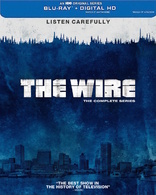
Movie rating
8.9 | / 10 |
Blu-ray rating
| Users | 5.0 | |
| Reviewer | 4.5 | |
| Overall | 4.5 |
Overview
The Wire: The Complete Series (2002-2008)
Baltimore drug scene, seen through the eyes of drug dealers, and law enforcement.
Starring: Dominic West, John Doman, Deirdre Lovejoy, Wendell Pierce, Lance ReddickDirector: Joe Chappelle, Ernest R. Dickerson, Clark Johnson, Ed Bianchi, Steve Shill
| Drama | Uncertain |
| Crime | Uncertain |
Specifications
Video
Video codec: MPEG-4 AVC
Video resolution: 1080p
Aspect ratio: 1.78:1
Original aspect ratio: 1.33:1, 1.85:1
Audio
English: DTS-HD Master Audio 5.1
French: DTS 2.0
Spanish: DTS 2.0
German: DTS 2.0
Subtitles
English SDH, French, German, Spanish, Danish, Dutch, Finnish, Norwegian, Swedish
Discs
50GB Blu-ray Disc
Twenty-disc set (20 BDs)
UV digital copy
Packaging
Slipcover in original pressing
Playback
Region free
Review
Rating summary
| Movie | 5.0 | |
| Video | 4.5 | |
| Audio | 4.0 | |
| Extras | 3.5 | |
| Overall | 4.5 |
The Wire: The Complete Series Blu-ray Movie Review
"We're building something here... and all the pieces matter."
Reviewed by Kenneth Brown May 19, 2015"The Wire is not about Jimmy McNulty. Or Avon Barksdale. Or crime. Or punishment. Or drugs. Or violence. Or even race," David Simon wrote in 2004. "It is about The City. It is about how we live as Americans at the millennium, an urban people compacted together, sharing a common love, awe, and fear of what we have rendered in Baltimore, St. Louis, Chicago, New York, Los Angeles. At best, our metropolises are the ultimate aspiration for the American community, the repository for every myth from rugged individualism to the melting pot. At worst, our cities -- or those places in our cities where most of us fear to tread -- are vessels for the darkest contradictions and most brutal competitions that underlie the way we actually live together.
He continued. "Mythology is important, essential even, to a national psyche. To coat an elemental truth with the bright gloss of heroism and national sacrifice is the prerogative of the nation-state. But to carry a lie forward, generation after generation, so that our collective sense of the American experiment is better and more comforting than it ought to be, this is where mythology has its cost. In a young and struggling nation, a moderate degree of self-elevating bullshit has a certain earnest charm. For an affluent and technological superpower, with its ever-increasing capacity to impose institutional will on its citizenry -- not to mention the world at large -- it begins to approach the Orwellian. Make no mistake: one television drama cannot and would not claim to be all of Baltimore, or all of anything as large, diverse, and contradictory as any American city. The Wire is most certainly not about what has been salvaged or exalted in America. It is, instead, about what we have left behind in our cities, and at what cost we have done so. It is, in its larger themes, a television show about politics and sociology and, at the risk of boring viewers with the very notion, macroeconomics. And frankly, it is an angry show."
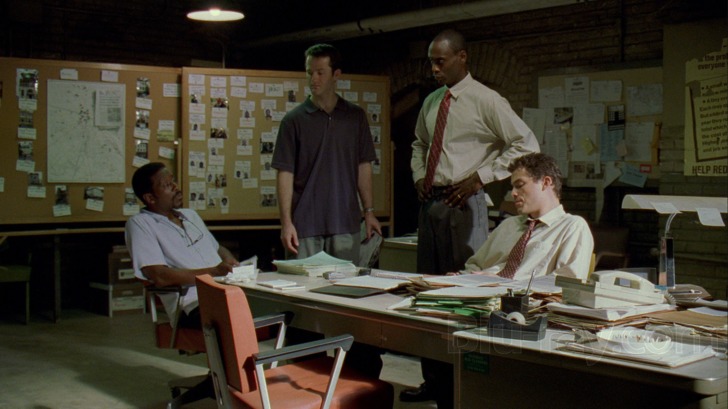
Simon has written at length, and for a great many years, attempting to frame his critically acclaimed cops-n-crooks drama in the context of his greater intent and grander vision. And with equal parts intelligence, eloquence and disheartened resignation, he's succeeded; certainly in making subsequent viewings of his series a richer, more rewarding examination of the cracks and recesses of The American Dream. But his frustration is clear. The Wire should not be the singular television event it is. Why aren't there more shows like it? It changed the game, its effects can still be felt in other series, so why aren't others carrying its torch? That's not what we want, that's why. Mass audiences are so smitten with fantasy and fiction, reveling in escapism, whether dark or light, that unflinching depictions of very real conditions, sobering social issues and class warfare frighten us. Scratch that. These things send us scurrying away, searching for entertainment that distracts us from the cold, hard truths we hate to face. It's too heavy. Too depressing. And what can I do about it anyway? It's hopeless.
It's that hopelessness, though, that Simon and his writers are desperate to drag into the light and expose. To shame, if not eradicate. From the streets to the docks, from the drug warzones to the school system, from the offices of The Baltimore Sun to the city's row houses, we see Baltimore not as it longs to be, or as we wish it would become, but as it is, without a coating of sugar or smearing of exaggeration. Social complacency is as destructive as crime, we're told for five gripping seasons, and the acceptance of the status quo, the seemingly unchangeable, does nothing more than lock We The People into a death spiral. Collectively, as a national community. There is no hope for a city like Baltimore, Simon and company suggest, at least as long as there's no hope in its people, no integrity in its politicians, no honor amongst its thieves, and no selflessness in its citizenry. More crucially, there's no hope for a city like Baltimore as long as the rest of the nation isn't interested in investing in change; specifically change that doesn't have an immediate and direct impact on an individual living some 1,000 miles away in a cozy, upper middle class suburb. It's not my city. My kids. My schools. My neighbors. My streets. Why should I care? Because it just as easily could be, Simon screams from the writer's room.
The Wire doesn't tolerate easy questions, peddle simple answers, or promise comfortable viewing. It's often a grueling series; one that pulls no punches and offers little solace. And that's by no means a criticism. It's praise reserved for the best television shows to ever grace the medium. Simon's "visual novel" is a sixty-episode masterwork of the highest caliber; a hard-hitting realization of television's potential and all at once a series that surpasses the potential, becoming something else entirely. Something piercing. Scathing. Thought-provoking. Unsettling. Living, breathing, bleeding. Important. Literary. Something meticulously crafted, superbly written, and extraordinarily performed. Something unlike anything the network has accomplished before or since, wherein the tagline "It's not TV, it's HBO" has never been more appropriate. If that reeks of hyperbole, you've probably never experienced The Wire, which judging by its tragically troubled ratings, includes a great many people. It's not too late, though. HBO's new Blu-ray release makes damn sure of that.
The Sopranos may have put HBO on the original series map, redefining and rebranding the premium cable network and influencing countless series on HBO and beyond. But it was The Wire that fundamentally altered -- and continues to alter -- the television landscape as we know it and drive public discourse, demanding unparalleled commitment from its audience, presenting viewers with the most challenging of themes, and never backing down from a fight. There haven't been many, if any, shows quite like it, but there should be. The Wire is something special, and should not be overlooked, underestimated or missed.
The Wire: The Complete Series Blu-ray Movie, Video Quality 
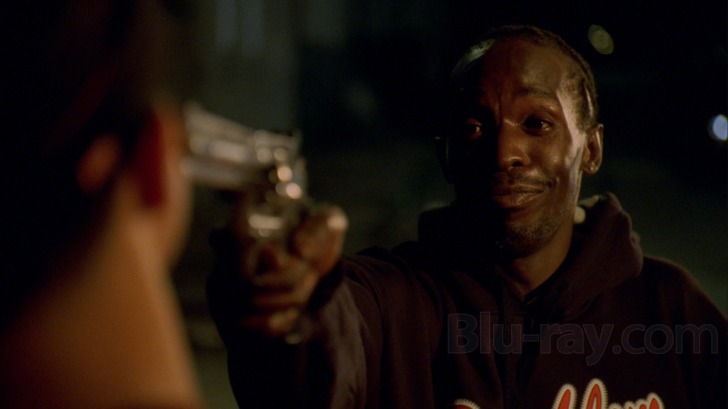
I suspect what relatively little controversy has been swirling around The Wire's 1.78:1 widescreen remaster will quickly fade as fans begin poring over the series' excellent, near-perfect 1080p/AVC-encoded video presentation. Purists will continue to grumble; and perhaps should, if only in principle. Having dual viewing options available, full frame and widescreen, would have been ideal, albeit more costly. However, even the most stringent purist's complaints will die down once they see how striking this "alternate version" (as creator David Simon has dubbed it) truly looks. In fact, if you didn't know The Wire hadn't always been presented in 1.78:1 widescreen, very little about this newly produced alternative would suggest anything had been changed. It's that seamless, organic and effective, and it's in no way reminiscent of Universal's disappointing Battlestar Galactica widescreen remaster. Again, The Wire revamp isn't perfect, but near-perfect all things considered.
First, though, a bit of history. While all five seasons of the show were originally broadcast in 1.33:1, The Wire was shot in 35mm and, for a time, protected for 16:9 letterbox by executive producer Robert Colesberry, who initially pushed to film the series in widescreen. All good, right? Not quite. As Simon succinctly explained in a candid and revealing December 2014 blog post, "If you compose a shot for a wider 16:9 screen, then you are, by definition, failing to optimize the composition of the 4:3 image. Choose to serve one construct and at times you must impair the other." Moreover, by the end of the second season, Simon, Colesberry, cinematographer Briesewitz and the directors of photography who proceeded him were no longer actively protecting the image for a possible 1.78:1 presentation. As Simon recounts it:
-
"Bob Colesberry died during surgery while we were prepping season three of the drama. A short time later, HBO came to us with news that the world was going to HD and 16:9, as Bob had anticipated. We could, if we wanted, film the remaining seasons of The Wire in HD and widescreen. But at that point a collective decision then was made to complete the project using the template that we had honed, the construct that we felt we had used to good effect to make the story feel more stolen than shaped, and to imply a more journalistic rendering of Baltimore than a filmic one.
Just as important, we had conceived of The Wire as a single story that could stand on its own across the five seasons. To deliver the first two seasons in one template and then to switch-up and provide the remaining seasons in another format would undercut our purpose tremendously, simply by calling attention to the manipulation of the form itself. The whole story would become less real, and more obviously, a film that was suddenly being delivered in an altered aesthetic state. And story, to us, is more important than aesthetics."
This shift to 1.33:1 optimization, along with numerous shots Simon has since deemed more artistic or meaningful via their original 1.33:1 composition, imposed several additional challenges during the remastering process. Thankfully, HBO invited Simon and executive producer Nina Noble to oversee and guide the later stages of the project, going so far as to delay the widescreen version's debut by several months so the duo could ensure the 1.78:1 image was as strong as it could be and, ultimately, as much to their satisfaction as possible. Problematic 1.33:1 shots were subtly altered to preserve artistic intent, visible equipment and crew members were carefully removed from the edges of the 1.78:1 image, and shots involving out-of-sync actors (who were previously off-screen) have been dealt with. (Further details about the remastering and Simon's involvement can be found here, along with a full overview of the process. I highly recommend it if the particulars of the widescreen vs. full frame debate are of any interest to you whatsoever. It's a terrific read.)
Aspect ratio adjustments and comparisons aside, how does it look? From the opening of the first season's pilot to the closing shot of the fifth season series finale, the color, contrast and clarity of The Wire's widescreen remaster impresses. And sometimes really impresses. There are a few soft shots here and there (typically a product of the original photography, not the remaster), hints of negligible black crush creep into the image on a few fleeting occasions, and instances of minor, inherent noise spiking affect a handful of darker scenes, but these represent the clear exception rather than the rule. Saturation is warm but lifelike, with natural skintones, lovely primaries, and deep, satisfying black levels. Even the series' shadows, which tend to border on aggressive, are home to a great deal of detail. (I found myself bumping my brightness setting up a notch or two above my calibrated settings, at least when watching the series in a brightly lit room, but it wasn't something I'd call indicative of a problem.) Add to that crisp edge definition, refined textures, well-preserved grain, and gorgeously resolved close-ups, as well as a lack of significant macroblocking, banding, aliasing and other encoding issues, and you have a presentation befitting HBO's high definition reputation.
Personally, I find that I actually prefer the widescreen version of The Wire to its full frame counterpart, and I was previously one of those very skeptical purists I mentioned above. That preference isn't a factor I considered when determining my video score -- seeing as it's a subjective opinion rather than a part of a more objective analysis -- but I think it's important to note the value of Simon's alternate take on the series. A variety of shots are simply that much more powerful in widescreen. There's a fullness and expansiveness to the remastered image that wasn't necessarily present before, at least by way of the 1.33:1 visuals. The city is bigger. The crime more widespread. The boarded-up row houses of Season Four that much more overwhelming (as the camera pulls back and Bunk realizes the potential enormity of the murders he and Freeman have uncovered.) The counter argument, of course, being that the 1.33:1 image trapped every character in a tighter, more oppressive environment that, in subtle ways, closed in on the cops and crooks from all sides. There's merit to both positions, but it's also possible to appreciate both versions.
Would I have rather had remastered full frame and widescreen presentations? Absolutely. Choice is king. Am I about to get worked up over it? Nope. Even if I had both versions sitting on my shelf, I doubt I'd ever go back to watching the full frame presentation. The widescreen image is that organic, rewarding and seamless. Ideal would have been nice, but this will do quite nicely.
The Wire: The Complete Series Blu-ray Movie, Audio Quality 
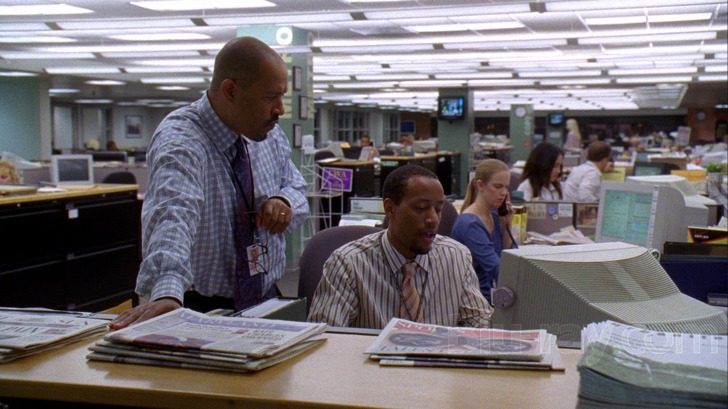
Less impressive though still entirely solid is HBO's DTS-HD Master Audio 5.1 surround track. There aren't any outright issues to report, just an intermittent, slightly nagging sense that the soundscape isn't quite as immersive or enveloping as I had hoped it would be. (Quite being the key word.) Chief suspect? The series' docudrama-esque sound design. Rear speaker activity is, at times, rather restrained, particularly in the first season, leading to a few too many scenes that are a bit too front-heavy. It isn't distracting or disappointing; just less involving on a regular basis than I was expecting. Even so, the groan of the city, the hum of the streets, the chatter across the project courtyard, the horns of distant ships nearing the docks, the bustling roar of a middle school hallway, and the tick-tack-tick keyboard clicking in a hushed newspaper office is represented fairly and justly, creating a decently engaging soundfield. Better still, LFE output is strong and steady, dynamics are excellent, cross-channel pans are smooth, and directional effects are reasonably precise. More suspenseful scenes take fuller advantage of every channel than the quietest sequences, but it's a consistent enough experience to earn respectable marks. Dialogue is clear, intelligible and perfectly prioritized at all times too, although you may, by no fault of the track whatsoever, find yourself turning on subtitles when it comes to deciphering everything select characters are saying. Er, mumbling. (Looking at you, Snoop.) Bottom line: the video presentation may be the showstopper of the set, but HBO's lossless audio track is no slouch.
The Wire: The Complete Series Blu-ray Movie, Special Features and Extras 
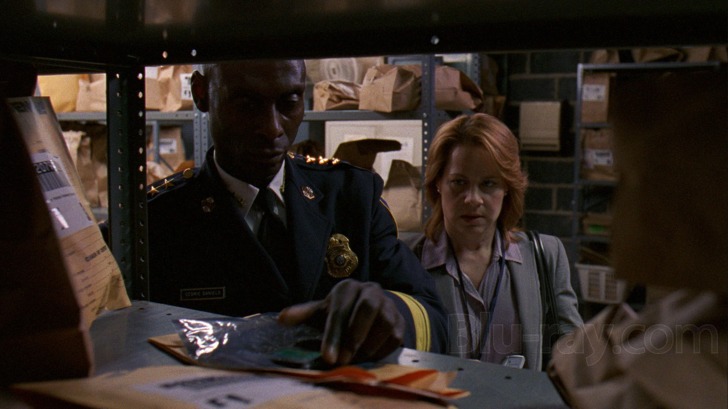
The Wire: The Complete First Season
- Audio Commentaries: The first season of The Wire features three strong, informative commentary tracks: "The Target" (Episode 1) with writer/creator David Simon, "The Detail" (Episode 2) with director Clark Johnson, and "Cleaning Up" (Episode 12) with Simon and writer George P. Pelecanos. It's a shame there's not more, or other extras entirely, but this is all the content that was available on the original DVD release.
The Wire: The Complete Second Season
- Audio Commentaries: There are only two commentary tracks available for The Wire's second season: "All Prologue" (Episode 6) with stars Dominic West and Michael K. Williams, and "Port in a Storm" (Episode 12) with co-producer Karen L. Thorson and editor Thom Zimny. Unfortunately, neither is particularly engaging -- minimal insight into the season, too much silence -- but the tracks represent the full supplemental package available on the previously released DVD set.
The Wire: The Complete Third Season
- Audio Commentaries: Five thoughtful, extensive commentaries make up the third season's supplemental package, each of which features key members of the creative team. Tracks include "Time After Time" (Episode 1) with creator David Simon and executive producer Nina K. Noble, "All Due Respect" (Episode 2) with writer Richard Price, "Dead Soldiers" (Episode 3) with Simon, "Middle Ground" (Episode 11) with writer George P. Pelecanos and director Joe Chappelle, and "Mission Accomplished" (Episode 12) with Simon and producer Karen Thorson. Silence eventually begins dominating some of the commentaries, and none of the series' actors are invited to contribute their perspective. However, the end result is still a richer understanding of the series, its characters, themes and nuances, and the less obvious intentions of the showrunners, writers and directors.
The Wire: The Complete Fourth Season
- Audio Commentaries: Six commentaries anchor the fourth season's extras, and this time members of the cast are in the mix. Tracks include "Boys of Summer" (Episode 1) with creator David Simon and producer Ed Burns, "Refugees" (Episode 4) with editor Katie Sanford, producer Karen Thorson and actor Jim True-Frost, "Margin of Error" (Episode 6) with director Dan Attias and story editor William F. Zorzi, "A New Day" (Episode 11) with actors Robert Chew, Jermaine Crawford, Maestro Harrell, Julito McCullum and Tristan Wilds, "That's Got His Own" (Episode 12) with director Joe Chappelle and writer George P. Pelecanos, and "Final Grades" (Episode 13) with creator David Simon and executive producer Nina K. Noble.
- Behind-the-Scenes Documentary (HD/SD, 59 minutes): Divided into two chapters, "It's All Connected" and "The Game Is Real," this hour-long documentary from the previously released DVD Set delves into the series' authenticity and examines how that authenticity bleeds into all aspects of the production.
The Wire: The Complete Fifth Season
- Audio Commentaries: The final season of The Wire offers some of the best commentaries, with both cast and crew digging into the fifth season as well as the entire run of the series. Tracks include "More with Less" (Episode 1) with director/co-executive producer Joe Chappelle and actor Wendell Pierce, "Unconfirmed Reports" (Episode 2) with writer/actor William F. Zorzi and director/actor Clark Johnson, "Transitions" (Episode 4) with writer/co-executive producer Ed Burns and producer Karen Thorson, "The Dickensian Aspect" (Episode 6) with producer George P. Pelecanos and director Seith Mann, "Took" (Episode 7) with director/actor Dominic West and editor Kate Sanford, and "-30-" (Episode 10) with creator David Simon and executive producer Nina K. Noble.
- The Wire Reunion (HD, 85 minutes): "Isn't it astonishing how little we've all aged over the years!" The only recently produced, newly available extra in the 20-disc Complete Series set is this excellent reunion special, recorded at PaleyFest in October 2014. Dominic West (Jimmy McNumty) and Idris Elba (Stringer Bell) aren't present, sending video messages and apologies in their absence, but thirteen others are, among them John Doman (William Rawls), Larry Gilliard, Jr. (D'Angelo Barksdale), Seth Gilliam (Ellis Carver), Jim True-Frost (Roland "Prez" Pryzbylewski), Jamie Hector (Marlo Stanfield), Michael Kenneth Williams (Omar), Sonja Sohn (Shakima Greggs), Wendell Pierce (Bunk Moreland), J.D. Williams (Bodie Broadus), Michael Lee (Tristan Wilds), Bob Wisdom (Bunny Colvin), producer Nina K. Noble, and creator/executive producer David Simon.
- The Last Word (HD/SD, 27 minutes): This 2008 DVD documentary looks into the crumbling, tabloid-driven world of 21st century journalism, the demoralization of honest journalists, and the flaws and sins of the modern media age, as it is in the real world and as explored through The Wire's fifth season.
- The Wire Odyssey (HD/SD, 29 minutes): Another extra from the 2008 DVD, featuring members of the cast and crew reflecting on the first four seasons of the series, the Dickensian nature of the stories, and the enormous ensemble of characters.
- Prequels (HD, 6 minutes): Little context is given before diving into these series prequel shorts, but there's a few surprises in store for fans of the show, from the childhood of Prop Joe (1962), the early exploits of a young Omar (1985), and the first meeting between McNulty and Bunk (2000). The shorts are presented in 1.78:1 widescreen high definition with DTS 2.0 audio.
The Wire: The Complete Series Blu-ray Movie, Overall Score and Recommendation 
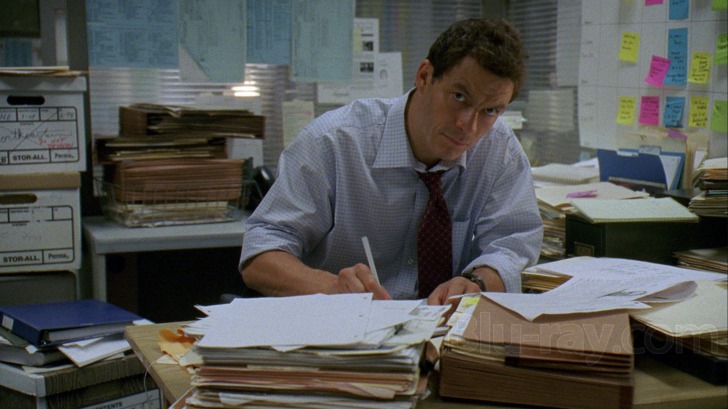
The Wire requires patience, observation, attention, analysis, commitment, and more patience, refusing to let its audience simply absorb its story and encounter its characters without being haunted by tremendously difficult questions that demand thought, reflection and the kind of societal soul searching that's far from comfortable. But the rewards are great and the pursuit even greater. David Simon's fearless series didn't win major awards, earn big ratings or last as long as other classic shows, but it remains one of the best television dramas of all time, and easily one of the best original series HBO has ever produced. And its 20-disc Blu-ray release? Terrific. I would have liked to see more newly produced extras, but the supplemental package is solid as is, the set's DTS-HD Master Audio 5.1 surround track is strong, and the remastered widescreen video presentation is outstanding. Having the option of watching remastered 1.33:1 and 1.78:1 versions of the show would have been a godsend, but the results are so impressive that that little disappointment isn't a deal-breaker. The Wire: The Complete Series is a must-have box set and comes highly recommended.
Similar titles
Similar titles you might also like

Boardwalk Empire: The Complete Fifth Season
2014

The Sopranos: The Complete Series
1999-2007

City of God
Cidade de Deus
2002

Animal Kingdom
2010

Gomorrah
Gomorra
2008

Kansas City
Arrow Academy
1996

The Irishman
2019

All the King's Men
Limited Edition to 3000 - SOLD OUT
1949

Red Riding: The Year of Our Lord 1974
2009

Bad Lieutenant 4K
1992

Carlito's Way 4K
1993

Cymbeline
2014

A Prophet
Un prophète
2009

The Ides of March
2011

Elite Squad: The Enemy Within
Tropa de Elite 2: O Inimigo Agora É Outro
2010

Mr. Smith Goes to Washington
1939

Wild Horses
2015

Bullets or Ballots
1936

Clockers
1995

Welcome to New York
2014
